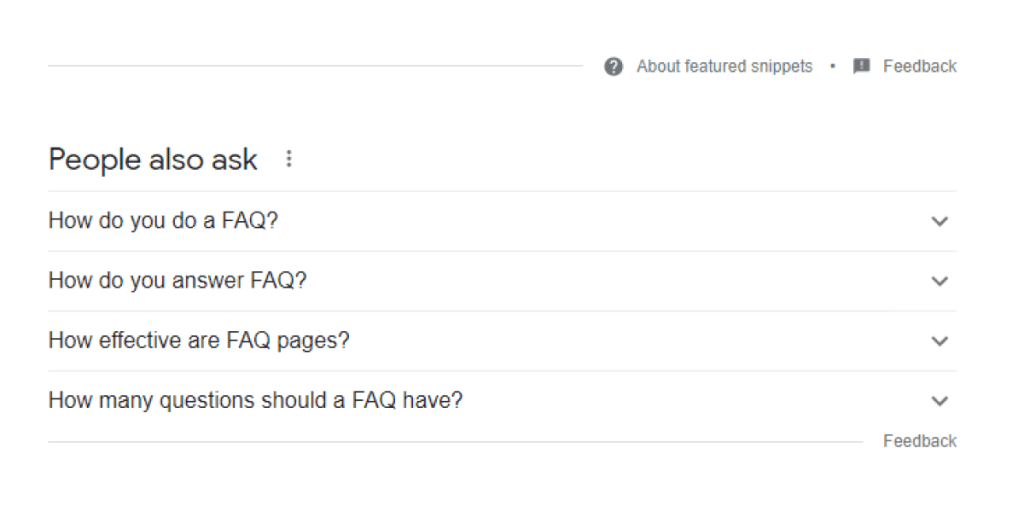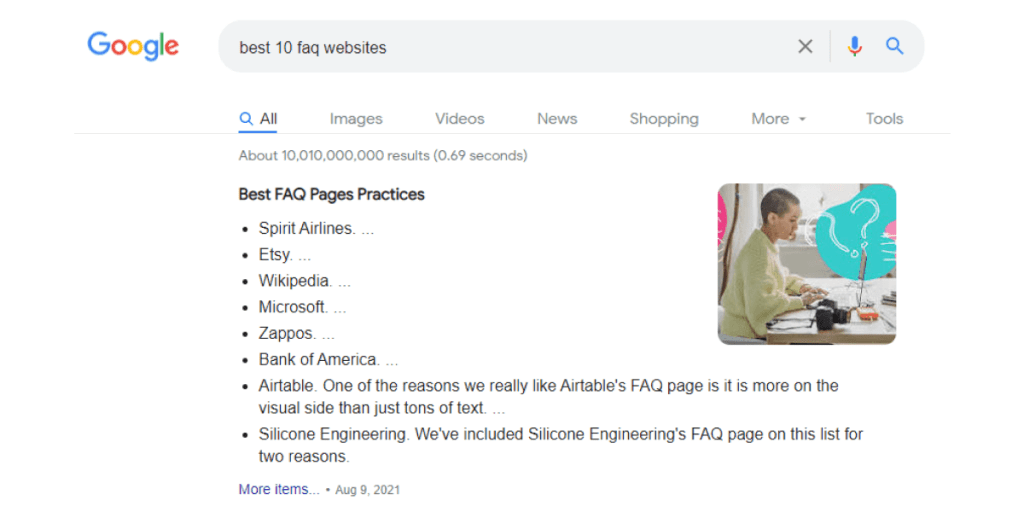What Are The FAQs for SEO and How You Can Implement Them?
Your customers are the epicentre of any digital marketing strategy you develop. If you leave your potential customers and target audience guessing, you will lose them. In SEO (search engine optimisation), search engines are your customers, and when they cannot find an answer fast, they will feature your competitors.
Our advice to avoid this from happening is to create a substantial and properly optimised Frequently Asked Question (FAQ) page. This approach provides prospective customers and any search engine with answers to their questions about your brand, company, products, or services.
Follow along to get more information about Frequently Asked Questions, their role in your SEO strategy and how to implement them for excellent results in organic searches.
What Are FAQs and Where Do You Find Them?

Frequently Asked Questions or FAQs are generally a web page with a list of questions and answers on a specific topic, product, service or company. An FAQ page is usually created as a tool to minimise the workload of the customer support team. Another purpose of this page is to show any online user that you acknowledge an issue consumers might have or answers to common questions. Businesses in the eCommerce industry will include answers to questions regarding shipping and returns policies. In the real estate industry, you will find questions with answers about how the agents operate, information about how to sell, buy or lease, etc.
More than that, Frequently Asked Questions are a significant element in improving search engine rankings and increasing organic traffic. They also fill the needs of your audience in a faster and more suitably way. You can educate, advise and guide every user logically through relevant content on your website toward the goals and results you have set in your marketing strategy. We firmly stand that FAQs are essential to all businesses, regardless of industry and size. FAQs meet user intent, and they make the customer journey smoother because you remove bottlenecks, and website visitors will receive the information they need in seconds.
Nowadays, FAQ answers appear on the first page of Google. The search engine is trying to update its results page to improve user experience by better matching the search intent. The two well-known places where popular questions and their answers are featured are in People Also Ask and Featured Snippets or Position Zero.
- People Also Ask (PAA) is a content block on Google’s search results page (SERP). When a person types a search query, the results page often includes the People Also Ask section with answers gathered from websites that answer to this particular query. The PAA box ranking is very similar to the standard SEO rankings. The PAA box shows only the top result for each question asked. It is crucial to create a high-quality content FAQ page and include relevant keywords displayed on this box.

- Featured Snippets or Position Zero is the information in the SERP displayed above the first Google search result. Position Zero is “booked” by the website that Google believes answers the best to the question’s search intent. Google will feature a content snippet from a website: a paragraph, a distinct sentence, or a bullet list. Feature Snippets help increase traffic from search engines. If you secure your spot in Position Zero, your website will be recognised as a quality domain authority.

Why Are FAQs Important for SEO?

FAQs are a priority in search engine marketing strategies because it is a helpful and straightforward way to improve your website through valuable content. At the same time, you help your website visitors, target audience and users.
The importance of FAQ pages has risen in the past years because of the popularity of voice search, home assistants, smart speakers and mobile search. These types of search functionality depend on the Featured Snippets.
Business owners should keep in mind and not ignore the fact that a FAQ page becomes an essential factor in organic ranking when optimised with target keywords and long-tail keywords, designed for user experience, and schema markup proper implementation.
A successful FAQ page is important because:
- Addresses your audience’s needs;
- Matches the user intent at every stage, from informational to transactional;
- It’s updated regularly based on data insights keeping users up to date;
- Offers solutions to user’s problems, therefore driving them to the website;
- Includes internal links to other essential pages to improve customer journey;
- Inspires content creation and new content marketing activities;
- Proves your expertise while increasing trust and authority within your audience.
We strongly recommend you think and structure your Frequently Asked Questions page. Do not throw around on your site random questions or include broken links and expect to be featured in the Position Zero, People Also Ask boxes or increase your organic traffic. More than that, searchers will not find any value in your answers as they cannot solve their issues or find the information they are looking for.
The ultimate goal of a FAQ page is to provide the best answer and solution to the actual questions your target audience is asking. We suggest paying attention to your on-page SEO elements and cornerstone content, optimising meta titles and meta descriptions, and adding structured data as they bring an overall value to the quality of your SEO.
Good FAQ pages are important for SEO, while flawed FAQ pages are bad for SEO. Every type of content you have on your website can influence how Google sees your business based on the way users interact with it.
Our Advice: How Do I Optimise My FAQ Page?
We have some tips on optimising your FAQ page if you want to boost the probability of being displayed in People Also Ask or Featured Snippets on Google.
1. Research
Before starting implementing anything, we strongly advise you to have a strategy. It may sound effortless to compile a list of random questions and answers, but the truth is, you should do some research first and know exactly what your goal with this page is.
- You can start by brainstorming and creating a list of questions you think online users are typing in the search bar.
- You can also go to your internal sales and customer service teams that connect with users every day. Add to your list additional questions gathered from these teams.
- The next step is to conduct audience research if possible. Get in touch with your customers, create pools, and do surveys or interviews. This will allow you to find out what they want to know.
- Next, you should look at chat conversations through AI chatbots and your site search data. Look for search volume keywords and search terms that are of interest to your audience.
- You can also explore forums such as Reddit and Quora. There you can find industry-specific, complex questions and issues from real users.
- Next up, look at the People Also Ask results to better grasp user intent for specific keywords.
- Your Google My Business listing can be a great source of getting the exact search queries people use to find your business.

2. Optimise
After your list is ready, you should ensure that the content is optimised. This means it is easy for Google to find, understand and index your page. Follow the following steps to ensure best practices:
- Formatting – questions should be formatted with header tags, and the answers are regular body texts.
- Keywords and Phrases – make sure you include the keywords and phrases you found in your research process. Write the questions and answers strategically to boost the odds of your content showing up on the search results page.
- Straightforward Answers – the first sentence of the paragraph should answer the question as clearly as possible. This way, it’s more likely that Google will index and display it for relevant searches.
- FAQ Schema – is the most important on-page SEO action to be done here. This is actually helping Google crawlers understand what type of content is on your website and how to index it. If you need help with the implementation, take a look at Google’s guide on how to mark up your FAQs with structured data. If you use WordPress, you can use the Yoast FAQ block.
- Page-Specific FAQs – it is a great idea to have a dedicated Frequently Asked Question page. Still, you can also add more actual content and FAQ structured data to other website pages such as product pages, service pages, event locations, blog articles, etc.
In conclusion, a great FAQ page can highly contribute to improving your organic search strategy and increasing the click-through rate. Your digital marketing strategy will benefit from an up-to-date FAQ page. If you are in search of a partner to follow the best practices and implement data-driven solutions that will help you grow your business, you can contact us today. On our Clutch profile, you can read the reviews from our previous and current partners, take a look at our portfolio to better understand how we operate and if you are curious about more SEO, marketing, development and design topics, check out our blog.
Frequently Asked Questions
You help your customers, and you get more chances to be featured on the People Also Ask and Featured Snippets boxes. You help your customers, and you get more chances to be featured on the People Also Ask and Featured Snippets boxes.
Yes. If the page is well-optimized. If not, it might affect your SEO.
Yes. Besides this section, you can add FAQs on other website pages.
Better organic traffic, improved visibility, better click-through rate, and you become more relevant to your target audience and prospective customers.